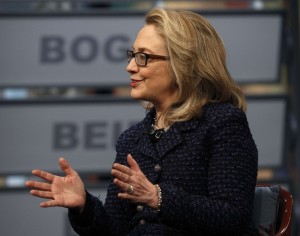Hillary’s Next Book–Thoughts on a 21st Century Blockbuster
 I was glad to be consulted by reporter Ruby Cramer of BuzzFeed.com for a story about one of the activities Hillary Clinton is likely to undertake now that she’s left the State Dept. That is, a book she’s said she plans to write and publish. Here’s a link to the story, “Hillary Clinton’s Unwrittten Memoir the Talk of the Publishing World.”
I was glad to be consulted by reporter Ruby Cramer of BuzzFeed.com for a story about one of the activities Hillary Clinton is likely to undertake now that she’s left the State Dept. That is, a book she’s said she plans to write and publish. Here’s a link to the story, “Hillary Clinton’s Unwrittten Memoir the Talk of the Publishing World.”
Because Cramer had space only for brief quotes from me and the other editors from whom she sought comment, here’s a bit more on what I talked about with her.
I pointed out that on each previous occasion when Hillary’s published a book, It Takes a Village (1996) and Living History (2004), the book world has been on the verge or in the midst of huge changes. In ’96, Amazon.com was barely a year old as an online bookstore and the Interent was just beginning to influence and define the wider culture, with the enormous impact it would soon exert on the book business. In 2004, social media was barely a blip, with Myspace one year old, and Facebook just getting started. Consider that a new Hillary book coming out, probably in 2014 or 2015, will exist in a world not only influenced by the prevalence of myriad social networks, but in a digitally dominant book space, with ebook adoption possibly on the upswing a year or two hence. I would add that while fiction has dominated ebook sales to this point, a new memoir from Hillary could become the first mega-nonfiction ebook bestseller.
While the Buzzfeed article spends a few lines discussing how high her advance might go in dollars, and for good reason, given the potential for a mammoth sum, I had suggested something different to Cramer. I said that if she was willing to take less money upfront, Hillary and her representative Robert Barnett might aim for an arrangement that would see her share profits in the book with her publisher, after expenses for production, design, distribution, and marketing were earned out. This 50/50 sharing model, though by no means common yet among authors and publishers, would also override the usual royalty structure that now applies where authors typically earn an average 15% royalty on hardcover sales, based on the book’s retail price, and 25% of the net price on ebook sales. Among brand-name authors, it has been reported that Stephen King has had this sort of profit-sharing arrangement on at least some of his titles. I should add that King publishes frequently with Scribner, an imprint of Simon & Schuster. S&S was also Hillary’s publisher for her two earlier books.
I’ll close here by saying that Hillary’s next book–given her instant name recognition and worldwide notoriety, and the cultural moment–is likely to present opportunities for connecting a book with readers in a way hitherto unavailable to any author or publisher. The marketing campaign that could be arranged and implemented, given the array of tools now available, ought to be something the likes of which the book business has not seen before. It’s a book I’ll be very eager to read.
[Please note the photograph accompanying this post also ran with the Buzzfeed.com story. It is credited to Gary Cameron/Reuters.]
